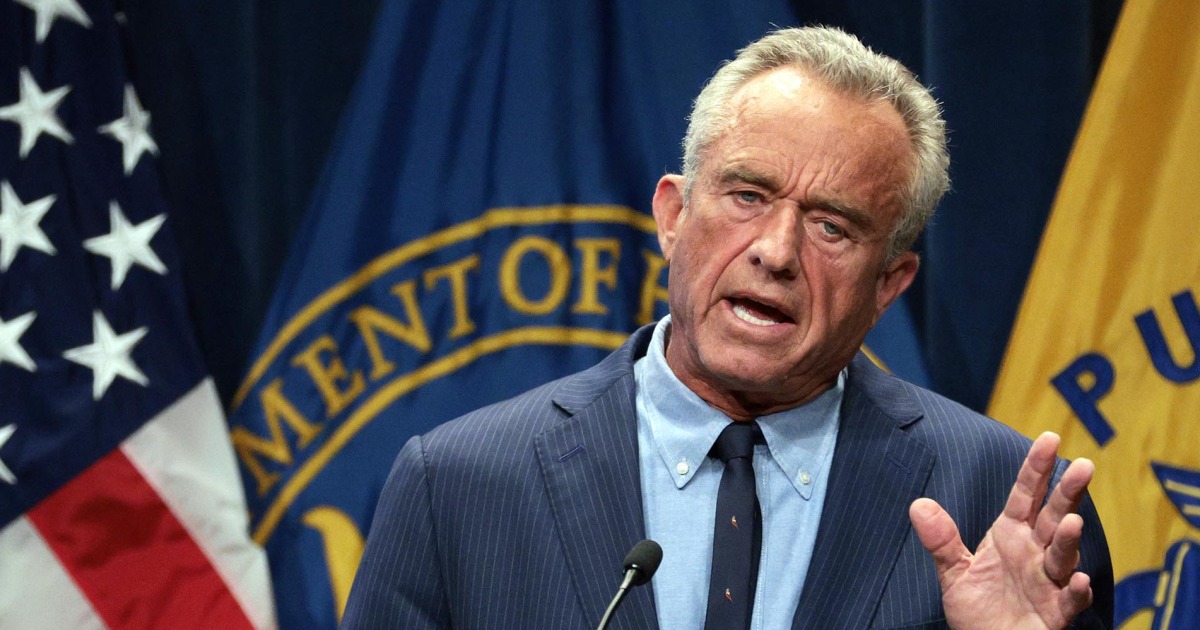Autism experts and advocates expressed alarm after the Department of Health and Human Services said Wednesday it intends to create a database of enrolled Medicare and Medicaid patients to support a study aimed at identifying the “root causes” of autism. Under the leadership of HHS Secretary Robert F. Kennedy Jr.
, the National Institutes of Health and the Centers for Medicare and Medicaid Services will partner up to build the database, using insurance claims data, electronic medical records and wearable technology, like smartwatches. In a release, Kennedy said the agency is “pulling back the curtain — with full transparency and accountability — to deliver the honest answers families have waited far too long to hear.” An HHS spokesperson declined a request to make an agency official available to discuss the project, including how it will be implemented, how it will define autism and how the data will be able to identify its causes.

In a news release, the agency said researchers would focus on autism diagnosis trends, outcomes from medical and behavior therapies, access to care and disparities by demographics and geography, and health care costs. Scientists have identified a variety of risk factors linked to the development of autistic traits — most of which exist before birth — including more than 100 genes believed to play a role in 60% to 80% of cases. Experts who’ve already spent decades researching the disorder said they worry about patient privacy under the new plan.
There’s a “lack of clarity around how the data will be collected, how it will be shared, maintained, and how we know it’s going to be accurate,” said Alison Singer, president of the Autism Science Foundation, a nonprofit group that helps to fund evidence-based autism research. Singer said her team has been inundated with calls and emails from people in the autism community concerned over the lack of transparency from federal health officials about how their private medical data would be obtained and managed. The database project doesn’t include input from the autism community and overlooks well-established genetic links to the disorder, experts say.
“We’ve had expert scientists who have been studying this issue for 20 years,” Singer said. “If there were one environmental toxin, I think we would have found it.” The project, according to HHS, will focus on autism diagnosis trends over time, health outcomes from “specific medical and behavioral interventions,” access to care and economic burden.
In a statement, the HHS spokesperson said, “Wearable devices can provide continuous, real-world data on sleep patterns, physical activity, stress markers, environmental exposures, and more — all of which may help researchers identify early-life factors associated with autism spectrum disorder.” The spokesperson didn’t respond to a question about how wearable devices would detect environmental exposures or who would be using them. Michael Snyder, a professor of genetics and director of the Center for Genomics and Personalized Medicine at Stanford Medicine, called the idea of using wearables to learn more about autism in general a “phenomenal idea.
” The challenge, he said, is that using wearables to get at the causes of autism would ideally require participants to wear them at an early age, before a diagnosis, and would also require a large sample size. Snyder is leading a small pilot study with a wearable device his team invented that measures environmental exposures as well as sleep and activity levels, to see if there are any links to autism. Singer said that currently, wearables are only used to alert teachers and caregivers to when an autistic person may become overwhelmed and overstimulated, and in need of a break.
“In the profound autism community, we’re using wearables to give an early warning as to when a meltdown might occur or self-injury may occur,” she said. “That enables someone to intervene.” Autism community backlash Autism and its possible causes have been an obsession for Kennedy over decades, starting with his false claim linking the measles, mumps and rubella (MMR) vaccine to the disorder — a connection that has been widely debunked by research from several countries.
Experts predicted that Kennedy would revisit his mission as health secretary — which came true last month when he announced a study to identify the root causes by September. Following a report published in April by the Centers for Disease Control and Prevention that found a rise in autism rates in children in the U.S.
, Kennedy said the study would look at “environmental exposures,” including mold, food additives, pesticides and medicines. Federal health officials were recently forced to walk back a plan to create a national registry of people with autism after backlash from the autism community. The registry would’ve included data from private medical records, which autism advocacy groups warned could violate people’s privacy and lead to people with autism to avoid or refuse medical care “for fear of their data being shared without their permission,” according to the Autism Science Foundation .
It's unclear how the new project, which will also rely on medical records, is any different. Zoe Gross, director of advocacy for the Autistic Self Advocacy Network, said, “None of us have been consulted on this. Under previous administrations, both Democratic and Republican, we have had more contact with HHS and more involvement in major projects involving autism.
” “Had we been able to give input into this, we would have suggested more clarity and different research aids,” Gross said..
Health

HHS plan to use Medicare and Medicaid data to study autism alarms experts over privacy

HHS said it intends to create a database of enrolled Medicare and Medicaid patients to support a study aimed at identifying the “root causes” of autism.















